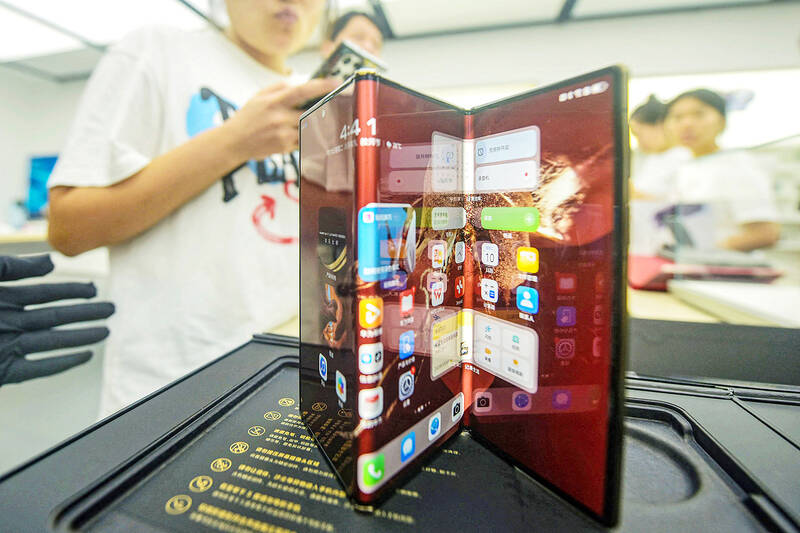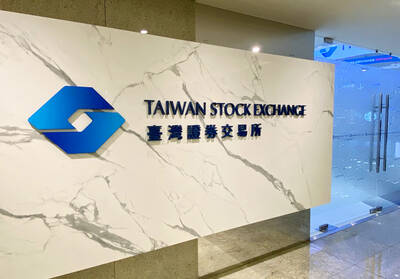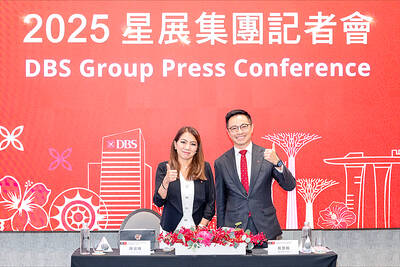China’s Huawei Technologies Co (華為) yesterday unveiled the world’s first tri-foldable phone, as it seeks to expand its lead in the world’s biggest smartphone market and steal the spotlight from Apple Inc hours after it debuted a new iPhone.
The Chinese tech giant showed off its new Mate XT, which users can fold three ways like an accordion screen door, during a launch ceremony in Shenzhen.
The Mate XT comes in red and black and has a 10.2-inch display screen. At 3.6mm thick, it is the world’s slimmest foldable smartphone, Huawei said.

Photo: AFP
The company’s Web site showed that it has garnered more than 3 million pre-orders for its Z-shaped tri-fold phone. This underscores Huawei’s ability to navigate US sanctions and solidifies its position against Apple in China, where some consumers criticized the new iPhone 16 for its lack of artificial intelligence (AI) features in the country.
Both smartphones are due to go on sale on Friday next week, the companies said.
Huawei already has two-way foldable phones in its lineup, and their strong sales in China helped it overtake Samsung Electronics Co this year as the biggest vendor of such phones globally.
However, with a price tag that starts at 19,999 yuan (US$2,809) — more than twice the starting price of the comparable iPhone 16 Pro Max — and limited production, the tri-fold phone is likely to become more of a symbol of Huawei’s tech prowess than a major sales driver, analysts said.
“The upcoming Huawei products are not expected to significantly impact Samsung and Apple’s businesses in terms of product quantity,” Counterpoint Research senior analyst Jene Park said.
“There is a limit to the quantity of products supplied. However, there may be some impact on sales in certain Chinese markets,” Park added.
Foldable smartphones account for just 1.3 percent of the broader smartphone market, and Huawei ranked as the world’s biggest foldable smartphone seller in the second quarter with a 27.5 percent market share, ahead of Samsung, with 16.4 percent, according to International Data Corp.
While Apple for years enjoyed strong demand in China, where new iPhone launches once sparked a frenzy, its sales have dwindled and the company’s ranking in China has now dropped from third to sixth place.
Apple and technology companies around the world are racing to add AI to products, and phones are expected to be among the most important battlegrounds.
The Cupertino, California-based company also is betting the AI feature would drive consumers to upgrade amid a slowdown in iPhone sales, which account for more than half of its total sales.
Apple Intelligence, the company’s AI software, will be used to improve its Siri personal assistant, as well as enhancing features such as understanding and identifying objects captured by the phone camera, the company said.
A test version of Apple Intelligence will be available in English as spoken in the US next month. It will be available for other localized versions of English in December, with versions in languages including Chinese, French, Japanese and Spanish next year.
The iPhone 16 and 16 Plus will use the new A18 chip and have an aluminum back, as well as a new customizable button that can be used for camera controls. The iPhone 16 will start at US$799 and the iPhone 16 Plus will start at US$899.
Apple also unveiled iPhone 16 Pro and 16 Pro Max, titanium models with a faster chip, the A18 Pro, and more AI capability, such as offering suggestions on how to set up a photo shoot more effectively. The iPhone 16 Pro will start at US$999 and the 16 Pro Max starts at US$1,199.
The company also introduced new Watches and AirPods with health-focused capabilities, as well as improvements in hardware design.

Taiwan Semiconductor Manufacturing Co (TSMC, 台積電) secured a record 70.2 percent share of the global foundry business in the second quarter, up from 67.6 percent the previous quarter, and continued widening its lead over second-placed Samsung Electronics Co, TrendForce Corp (集邦科技) said on Monday. TSMC posted US$30.24 billion in sales in the April-to-June period, up 18.5 percent from the previous quarter, driven by major smartphone customers entering their ramp-up cycle and robust demand for artificial intelligence chips, laptops and PCs, which boosted wafer shipments and average selling prices, TrendForce said in a report. Samsung’s sales also grew in the second quarter, up

LIMITED IMPACT: Investor confidence was likely sustained by its relatively small exposure to the Chinese market, as only less advanced chips are made in Nanjing Taiwan Semiconductor Manufacturing Co (TSMC, 台積電) saw its stock price close steady yesterday in a sign that the loss of the validated end user (VEU) status for its Nanjing, China, fab should have a mild impact on the world’s biggest contract chipmaker financially and technologically. Media reports about the waiver loss sent TSMC down 1.29 percent during the early trading session yesterday, but the stock soon regained strength and ended at NT$1,160, unchanged from Tuesday. Investors’ confidence in TSMC was likely built on its relatively small exposure to the Chinese market, as Chinese customers contributed about 9 percent to TSMC’s revenue last

Taiwan and Japan will kick off a series of cross border listings of exchange-traded funds (ETFs) this month, a milestone for the internationalization of the local ETF market, the Taiwan Stock Exchange (TWSE) said Wednesday. In a statement, the TWSE said the cross border ETF listings between Taiwan and Japan are expected to boost the local capital market’s visibility internationally and serve as a key for Taiwan becoming an asset management hub in the region. An ETF, a pooled investment security that is traded like an individual stock, can be tracked from the price of a single stock to a large and

Despite global geopolitical uncertainties and macroeconomic volatility, DBS Bank Taiwan (星展台灣) yesterday reported that its first-half revenue rose 10 percent year-on-year to a record NT$16.5 billion (US$537.8 million), while net profit surged 65 percent to an unprecedented NT$4.4 billion. The nation’s largest foreign bank made the announcement on the second anniversary of its integration with Citibank Taiwan Ltd’s (花旗台灣) consumer banking business. “Taiwan is a key market for DBS. Over the years, we have consistently demonstrated our commitment to deepening our presence in Taiwan, not only via continued investment to support franchise growth, but also through a series of bolt-on acquisitions,” DBS